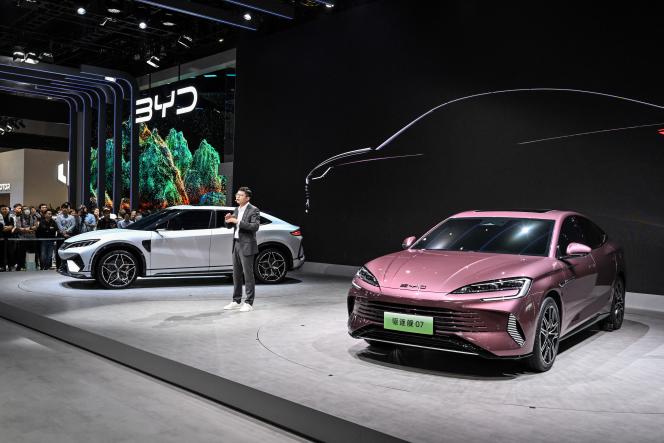In China, times are tough for foreign brands. After having long dominated the world’s largest automobile market, their influence has inexorably shrunk over the past five years. In the first half, Chinese brands were in the majority, after rising seven points in one year. This decline is directly linked to the rapid rise of electric models, which now represent 22.7% of total registrations (compared to 15% in Europe) and have enabled local manufacturers to widen the gap against their European rivals, Japanese or American.
Apart from Tesla, overtaken at the start of 2023 by the very ambitious Shenzhen (South-East) firm BYD, but which appears to be the only Western brand capable of keeping pace, foreign competitors are suffering from the narrowness of their range and their lag in electric vehicle design. The severe price war launched in the spring by Tesla also contributed to their marginalization.
In an attempt to get back into the game, some major Western groups have resolved to get closer to their Chinese competitors to negotiate partnerships whose terms no longer have anything to do with those concluded in the early 2000s. The balance of power, in fact, has been reversed: henceforth, it is the foreign manufacturers who seek to benefit from technology transfers, and they will have to pay a high price for them.
Race for cooperation agreements
Volkswagen, which has just lost its historic position as number one in sales and weighs only 2.4% of electric car registrations (compared to 3.5% a year earlier), has embarked on a race for cooperation agreements. The German group, which sells 40% of all of its production in China, believes it has no time to lose. In July, he announced an investment of 700 million dollars (643 million euros) in the XPeng brand, in which he acquired nearly 5% of the capital.
Volkswagen will be able to use a sophisticated computer platform equipped with an extremely powerful supercomputer developed by its partner. This should enable it to design two vehicles specifically intended for Chinese motorists, who are well versed in connected services and automated driving functions. The first could be marketed from 2026.
While its subsidiary Audi has approached SAIC Motor for the same reasons, the Volkswagen group has initiated parallel talks with Leapmotor to progress in the field of software architecture. It has also concluded a contract with Horizon Robotics, a specialist in artificial intelligence, to accelerate its research into autonomous cars. These links have been established in order to“expand the product range” and of “gaining speed in the Chinese market”, we explain in Wolfsburg.
You have 41.04% of this article left to read. The following is for subscribers only.
